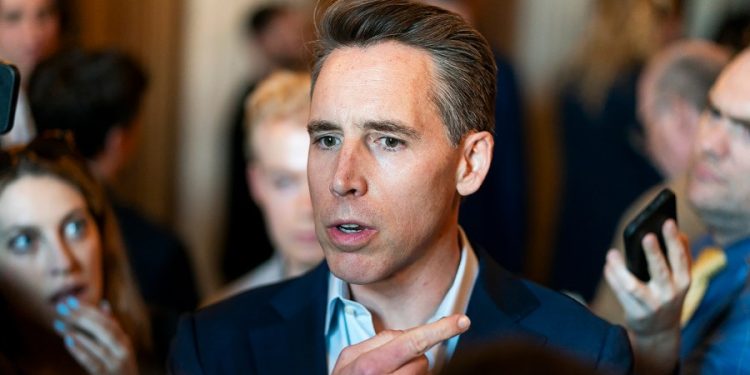The Senate’s deep cuts to Medicaid in the tax and spending megabill are setting off alarm bells among some Republicans, complicating leadership’s effort to get the legislation passed by July 4.
It seeks to clamp down on two tactics states use to boost Medicaid funding to hospitals: state-directed payments and Medicaid provider taxes. The restrictions are a major concern for rural hospitals, a key constituency for senators.
Republicans have set an ambitious July 4 deadline to pass the bill and send it to President Trump to be signed into law.
Sen. Josh Hawley (R-Mo.), who has been warning his colleagues about making cuts to Medicaid for weeks, said the changes took him by surprise.
“I had no idea that they were going to completely scrap the House framework with this. I mean, this totally caught me by surprise. And I’ve talked to other senators, and that’s what I’ve heard consistently from everybody I’ve talked to, that no one was expecting this entirely new framework,” Hawley told reporters Tuesday.
States impose taxes on providers to boost their federal Medicaid contributions, which they then direct back to hospitals in the form of higher reimbursements.
Critics argue it’s a scheme for states to get more federal funding without spending any of their own money. But provider taxes have become ingrained into states’ Medicaid financing systems. States and provider groups say the taxes provide a steady source of financing for hospitals that operate on thin margins and would otherwise face closure.
“The draconian Medicaid cuts contained in the Senate bill would devastate health care access for millions of Americans and hollow out the vital role essential hospitals play in their communities,” said Bruce Siegel, president and CEO of America’s Essential Hospitals, an organization that represents hospitals that serve low-income patients.
The legislation would effectively cap provider taxes at 3.5 percent by 2031, down from the current 6 percent, but only for the states that expanded Medicaid under the Affordable Care Act. The cap would be phased in by lowering it 0.5 percent annually, starting in 2027.
Nonexpansion states would be prohibited from imposing new taxes, but as was true in the House-passed version, their rates would be frozen at current levels. The lower cap would not apply to nursing homes or intermediate care facilities.
All states except for Alaska finance part of their share of Medicaid funding through health care provider taxes, and 38 states have at least one provider tax that exceeds 5.5 percent.
When asked if his concerns were enough to make him vote against the bill if it were brought to the floor as written, Hawley hedged.
“It needs a lot of work, so I would say maybe we could, I guess, try to fix it on the floor, but it’d be better to do it beforehand,” he told reporters.
Republicans can afford to lose only three votes in the Senate and still pass their bill if Democrats remain united in opposition.
Sen. Jim Justice (R-W.Va.) said he was also surprised by the Senate’s change. If provider tax changes are on the table, he said he wants leadership to keep the House version. Justice wouldn’t say how he would vote if the provision was left unchanged but expressed some unease about the July 4 deadline.
“I promise you, I won’t rubber-stamp anything,” Justice said. “I want this thing to come out and come out quickly, but when it really boils right down to it, you may have to hold your nose on some things that you just absolutely don’t like because we can’t like everything.”
Similarly, Sen. Bill Cassidy (R-La.) indicated he would also prefer the House-passed freeze on provider taxes but was still analyzing the impact on his state. Louisiana expanded Medicaid in 2016.
Senate Republican leaders huddled with members Tuesday during a closed-door caucus lunch to talk through the details of the bill. Speaking to reporters afterward, Majority Leader John Thune (R-S.D.) said leadership was listening to members’ concerns, especially about provider taxes.
“We think [the changes] rebalance the program in a way that provides the right incentives to cover the people who are supposed to be covered,” Thune said. “We continue to hear from members specifically on components or pieces of the bill they want to see modified or changed, and we are working through that.”
Members were also briefed by Centers for Medicare and Medicaid Services Administrator Mehmet Oz, who downplayed the impact of a lower provider tax cap.
“We do not believe that addressing the provider tax effort is going to influence the ability of hospitals to stay viable,” Oz told reporters.
Without weighing in on the exact details, Oz said some changes to provider taxes and state-directed payments should be included.
“The framework of addressing the legalized money laundering with state-directed payments and provider taxes must be in this bill, it should be in this bill,” Oz said.















